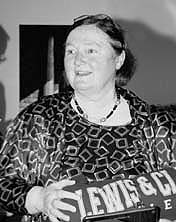College says auf wiedersehen to Jung

Nearly 150 program alumni and Lewis & Clark administrators feted Jung with heartfelt tributes and mementos on April 9 at a poignant reception in the Gallery of Contemporary Art. “She brought sensitivity, dedication, ingenuity, creativity, and indomitable optimism,” said Dinah Dodds, professor of German, dean of arts and humanities, and a longtime colleague. “She is a can-do person par excellence, and without her the Munich program would not have been anything like what it is.”
The bittersweet affair celebrated what began in 1968 when Jung, then a 25-year-old newlywed, arrived in Portland with her husband on a cargo freighter from Munich. She soon found work as a German instructor at Lewis & Clark, then returned to her hometown five years later, the same year the College launched its Year of Study in Munich program at Ludwig-Maximilians-Universität. Jung enlisted as an instructor, but when the program’s inaugural director died suddenly in midyear, she agreed to take the reins.
To Jung, it was a dream job. She was free “to set up my own goals and to bring to life my own ideas.” The result: an intense, two-semester program known for its academically rigorous curriculum and cultural immersion. Her goal for the two dozen students who enrolled each September, about half of whom were Lewis & Clark undergrads: “To grow up.”
That she accomplished by arranging culturally enriching field trips, interviews, internships, and exchange programs (including the only Cold War arrangement with an East German university), and by providing European travel stipends for students pursuing independent-study projects. “Can we do something we can’t do on campus? That was always my aim,” Jung explains.
Students also partake in a challenging academic program that begins with an intensive, four-week language seminar in September, continues with regular university courses taken right alongside their German counterparts, and culminates in July, by which time they write papers and deliver oral presentations in German. Jung says the program’s yearlong duration is critical to its efficacy. “Winter semester allows them to adapt. Summer semester,” she adds, “is when they really emerge.”
Jung was instrumental in nurturing that emergence. Anna Schatz ’88 and Paige Daugherty Wescott ’88, both veterans of the 1985-86 program, marveled at Jung’s ability to sense where each student was—both physically and emotionally—and to steer them toward their goals. “She had tentacles,” said Schatz, adding that Jung helped bolster her social life. “She opened doors for me and supported me,” said Wescott, explaining how Jung connected her with athletic coaches and voice trainers.
Jung calls her relationships with students the most rewarding part of her 29-year tenure. “I try not to be the mother hen,” she insists, “but I like to be there when they need me.”
Jung hopes to lure program alumni—many of whom stay in touch and visit—to return to Munich for an October 5 farewell party, which will include an afternoon boat ride on Lake Starnberg. Jung, who turns 60 on October 1, says she is retiring while she is “still young enough to do other things. I’m not exhausted yet.” Her successor is Ralf Saborrosch, a former program instructor who has led social outings for students and who Jung says will bring fresh energy and ideas.
Yet she hopes to remain part of the program’s future, possibly by recruiting Eastern European students to further enrich the program with yet more foreign cultures. “What I think I’m best at, and what I would like to continue,” Jung adds, “is to be a teacher.” The nearly 350 Lewis & Clark alumni once under her tutelage in Munich would surely agree.
—by Dan Sadowsky
More L&C Magazine Stories
Lewis & Clark Magazine is located in McAfee on the Undergraduate Campus.
MSC: 19
email magazine@lclark.edu
voice 503-768-7970
fax 503-768-7969
The L&C Magazine staff welcomes letters and emails from readers about topics covered in the magazine. Correspondence must include your name and location and may be edited.
Lewis & Clark Magazine
Lewis & Clark
615 S. Palatine Hill Road MSC 19
Portland OR 97219

